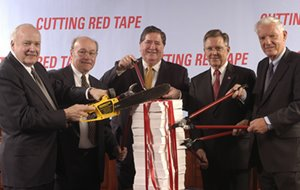Well, the two sides have pretty much identified themselves already, but I think that they are both missing the part of how all these actions that all these various people, both public sector and private sector took, was enabled by the de-regulation regulatory and economic conditions within which they operated. The onset of those conditions does go back to the Clinton administration.
Further, it always seems that everyone neglects the supply chain aspect of all this. Originators such as CountryWide originated bad risk mortgages, such as the NINJA mortgage (No Income, No Job or Assets) for well beyond what even the most optimistic value of the home was. These were sold to a middle man bank, which bundled them up, and eventually made it's way to the investment banksters, which carved them up into traunches, secured them against lost with CDO, had them rated as 'Class A investments' by rating agencies which didn't know what they were rating, and then sold world wide, spreading the toxin. At each step, there was easy money to be made. The same can be said for the house flippers, and those treating their houses like ATMs, re-mortgaging like every 3 months for ever larger a mortgage value (I was told of this from some tax preparers).
This house of cards that got built worked out just fine while all the housing evaluations kept going up and up and the mortgages amounts did the same, but reality has a way of putting a stop to that when either or both grew to the ridiculous level, which they did.
While all this was going on, both parties in the congress and the administration knew the excrement was going to hit the fan at sometime, and really thoroughly, and while there were a number of attempts to put sanity back in the driver seat, none of them succeeded for all the wrong reasons. So each of them has their fair share of blame for this mess as well, some for direct actions they took, and some for actions that they didn't take.
The banksters figured they were safe with their CDOs protecting them, but when the the CDO insurance company, AIG, went belly up they too had claims and demands made against them that weren't covered by AIG and their CDOs, so they went belly up as well, one by one.
The administration took it on themselves to 'rescue' everyone from their own folly (especially the bankserts), and tried to give the economy a softer landing, which it did, but the landing was a harsh one none the less, and panic ensued and a deep recession took hold, all the businesses were looking to save every scrap of cash they could to help them weather the recession and survive. Unfortunately, in many businesses, the workforce is the quickest and easiest thing to cut back. And that's why at the tail end of the Bush administration the economy was shedding some 800,000 jobs a month, not that this was typical in any way for all the rest of his administration.
So what have the following congresses and administrations done to prevent such a fiscal atom bomb from forming and going off again? Have those in power learned anything from the pain on mainstreet? Nope.
The promised of 'End of too big to fail' Dodd-Frank fiasco does exactly nothing to prevent banks and other financial institutions from becoming too large that their failure wouldn't sink the entire economy. If anything Dodd-Frank, with it's stupidly written regulations which are far too costly to comply with, have squeezed small banks out, forcing them to consolidate into larger banks in order to be able to afford the overhead. The result is a mono-culture of only large banks, and as everyone knows, mono-cultures are far more susceptible to the threats that changes in business condition and economic conditions present, rather than diversity which is inherently more more resilient. As is in biology, so is it in the economic world as well.
While the present administration and president laud how well the economy is doing, the reality is really far from that, as all the regulations they've instituted have dulled GDP growth from the more normal 3-5% to between 1-2%, hardly anything to write home about. But inconvenient facts such as these are ignored by the present administration and president such as they always have been, which is little more than being a used car salesmen.

